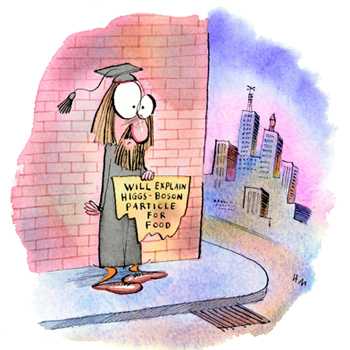Having written previously about the brain-drain in federal agencies,  I feel this is kind of redundant, but I keep hearing about it so I keep getting aggrieved by it. Today started off good. Good because I had a productive meeting where those involved felt my approach was on the right path to the final product. And we south quick, as immediately after the good meeting we had an all hands meeting with the director for science at the EPA (very high up the food chain) basically say that over the course of the next five years EPA will be reducing the number of Full Time Employees (FTE) to “right size” (aka downsize) the agency. This means basically letting people retire without replacement and not hiring anyone new. We had a full on cabal among the post doc in an impromptu meeting afterwards where we bitched and moaned and realized we are never going to be hired, and that we need to seek employment elsewhere, despite the fact that all of us are willing to work for less money than we could get (in industry) and less freedom (academics) in order to be public servants. The director of science also read from the website of the US Senate Committee on Environment and Public Works (the committee that over sees the EPA and our budget) and it had a top 10 list about reasons why the government shutdown is a good thing and 5 out of 10 were related to the EPA (all of which were so ridiculously and patently false bits of radical right propaganda that I won’t even deign to lead you to the link). While I appreciate his candor, it does nothing to improve my downtrodden outlook on things. I am working as hard as I can to push forward government science that is both highly innovative and defensible. It is not easy to balance these two things. Generally scientists who are on the cutting edge of science need to be willing to go out on a limb to move the science forward, with the assumption being that sometimes that limb breaks and a new direction is required. For academic scientist (particularly those in tenure track) this is a win-win, because tenure committees reward innovation and moving the science forward mostly with regard for the ultimate outcome. Government scientists are faced with the harsh reality that our successes are rarely lauded on high, because by nature they are often incremental, where as our failures are matters of public record and “cost tax payers money”. Even with this I would love to dedicate the next 30+ years of my life to public service. But alas, the no vacancy sign will be hanging around for at least the next 5 years, too long for me to wait (AKA find another post-doc). So instead I’ll move on, out of government service and into a new place that I will make into a successful career. If I was the only one affected then, that isn’t much of a story. I just came from a meeting of 6 other post-docs who work in my lab, all of whom are in the same situation (really all 7 of the post-docs in the lab are in the same situation, one was just not at the meeting). That is 7 people whose positions end within a year or two who will then have to leave the EPA and find employment elsewhere. And while there are several Universities in the area, the chances of a faculty position opening up, and then 1 of the 7 of us getting the position is pretty slim. So 7 of us will be leaving, after several years of integrating and innovating the research programs in this lab, we will go, taking with us our technical skills and our personal connection to the lab, only to have them filled in a stop gap measure with another set of post-docs. I understand (and fully understood when I started) that post-docs are the motor that drives research. We produce the grind through research and pump out papers because we are generally unburdened with the planning and managing requirements of those higher up. But what happens when the gap between the drivers (senior scientist and principal investigators) and the engines (post-docs) gets so great that they can no longer communicate. As an example, take the lab where I work, a lab that is full of amazing and incredibly smart people, many of whom are world’s experts. If we were to gather all 79 FTE in a conference room (down from 106 a few years ago) what do the demographics look like. First, the extremes: there are no FTEs in the 20-30 range, while there are at 2-3 in their 70s. The 30-40 range finds a handful more employees, but only 2-3 scientific staff, with another 2-3 administrative staff. A larger number, 10-15, fall within the 60-70 range. About 20 fall between 40-50 and another 30 fall into the 50-60 rang. This not a good demographic breakdown for any organization. Given that many federal employees are eligible to retire after 30 years of service and that many of the those folks started in their late 20s or early 30s, a large portion of people who work in my building will be eligible to retire within the next 5 years, perhaps as many as 40%. Again this is just one lab in one location, but within the EPA this is really more a systemic problem than a local one. The other issue is that all FTE are not equivalent. The longer you are a federal employee the more you move up the ladder in terms of pay grade. While this is an excellent incentive to keep employees long-term, when demographics become skewed, as they are currently, it means each FTE costs more on balance. The talk is all about “right sizing” the organization by reducing FTE essentially through retirement (since it is hard to fire or lay off federal employees). This process only serves to exacerbate the situation, not create a long term solution. The presenter today said that after 2006 hiring of post-docs (and technical staff) declined precipitously throughout the organization. Given the current situation with American governance, I am not going to hold my breath. It is disheartening to put so much effort into the works of an organization that sees you as a replaceable hamster on the flywheel. This does not reflect on my supervisors or any of the people whom I work with, but rather the overarching organization. Right now my only I’m in a position that doesn’t benefit me for a future academic post (I can’t teach or write grants), and doesn’t really help me for an industrial post (which tend to focus on science directly related to regulation which impact their business). I have a lot on my plate right now. I’m working on 5 manuscripts, plus part of the team for another 6 or so, but when I get done, so what? who fucking cares? Obviously not my government. Ain’t that a motherfucker! Sorry for the foul language, but honestly, I’m in a foul mood, so thus I vent. Hopefully this will get it out of my system, all though I doubt it. I want to believe in government. I want do science for the government. I want to make my country better, cleaner, greener, more sustainable. I want to serve my country in the way that I am best able, to use my skill to better our Nation, but alas…
I feel this is kind of redundant, but I keep hearing about it so I keep getting aggrieved by it. Today started off good. Good because I had a productive meeting where those involved felt my approach was on the right path to the final product. And we south quick, as immediately after the good meeting we had an all hands meeting with the director for science at the EPA (very high up the food chain) basically say that over the course of the next five years EPA will be reducing the number of Full Time Employees (FTE) to “right size” (aka downsize) the agency. This means basically letting people retire without replacement and not hiring anyone new. We had a full on cabal among the post doc in an impromptu meeting afterwards where we bitched and moaned and realized we are never going to be hired, and that we need to seek employment elsewhere, despite the fact that all of us are willing to work for less money than we could get (in industry) and less freedom (academics) in order to be public servants. The director of science also read from the website of the US Senate Committee on Environment and Public Works (the committee that over sees the EPA and our budget) and it had a top 10 list about reasons why the government shutdown is a good thing and 5 out of 10 were related to the EPA (all of which were so ridiculously and patently false bits of radical right propaganda that I won’t even deign to lead you to the link). While I appreciate his candor, it does nothing to improve my downtrodden outlook on things. I am working as hard as I can to push forward government science that is both highly innovative and defensible. It is not easy to balance these two things. Generally scientists who are on the cutting edge of science need to be willing to go out on a limb to move the science forward, with the assumption being that sometimes that limb breaks and a new direction is required. For academic scientist (particularly those in tenure track) this is a win-win, because tenure committees reward innovation and moving the science forward mostly with regard for the ultimate outcome. Government scientists are faced with the harsh reality that our successes are rarely lauded on high, because by nature they are often incremental, where as our failures are matters of public record and “cost tax payers money”. Even with this I would love to dedicate the next 30+ years of my life to public service. But alas, the no vacancy sign will be hanging around for at least the next 5 years, too long for me to wait (AKA find another post-doc). So instead I’ll move on, out of government service and into a new place that I will make into a successful career. If I was the only one affected then, that isn’t much of a story. I just came from a meeting of 6 other post-docs who work in my lab, all of whom are in the same situation (really all 7 of the post-docs in the lab are in the same situation, one was just not at the meeting). That is 7 people whose positions end within a year or two who will then have to leave the EPA and find employment elsewhere. And while there are several Universities in the area, the chances of a faculty position opening up, and then 1 of the 7 of us getting the position is pretty slim. So 7 of us will be leaving, after several years of integrating and innovating the research programs in this lab, we will go, taking with us our technical skills and our personal connection to the lab, only to have them filled in a stop gap measure with another set of post-docs. I understand (and fully understood when I started) that post-docs are the motor that drives research. We produce the grind through research and pump out papers because we are generally unburdened with the planning and managing requirements of those higher up. But what happens when the gap between the drivers (senior scientist and principal investigators) and the engines (post-docs) gets so great that they can no longer communicate. As an example, take the lab where I work, a lab that is full of amazing and incredibly smart people, many of whom are world’s experts. If we were to gather all 79 FTE in a conference room (down from 106 a few years ago) what do the demographics look like. First, the extremes: there are no FTEs in the 20-30 range, while there are at 2-3 in their 70s. The 30-40 range finds a handful more employees, but only 2-3 scientific staff, with another 2-3 administrative staff. A larger number, 10-15, fall within the 60-70 range. About 20 fall between 40-50 and another 30 fall into the 50-60 rang. This not a good demographic breakdown for any organization. Given that many federal employees are eligible to retire after 30 years of service and that many of the those folks started in their late 20s or early 30s, a large portion of people who work in my building will be eligible to retire within the next 5 years, perhaps as many as 40%. Again this is just one lab in one location, but within the EPA this is really more a systemic problem than a local one. The other issue is that all FTE are not equivalent. The longer you are a federal employee the more you move up the ladder in terms of pay grade. While this is an excellent incentive to keep employees long-term, when demographics become skewed, as they are currently, it means each FTE costs more on balance. The talk is all about “right sizing” the organization by reducing FTE essentially through retirement (since it is hard to fire or lay off federal employees). This process only serves to exacerbate the situation, not create a long term solution. The presenter today said that after 2006 hiring of post-docs (and technical staff) declined precipitously throughout the organization. Given the current situation with American governance, I am not going to hold my breath. It is disheartening to put so much effort into the works of an organization that sees you as a replaceable hamster on the flywheel. This does not reflect on my supervisors or any of the people whom I work with, but rather the overarching organization. Right now my only I’m in a position that doesn’t benefit me for a future academic post (I can’t teach or write grants), and doesn’t really help me for an industrial post (which tend to focus on science directly related to regulation which impact their business). I have a lot on my plate right now. I’m working on 5 manuscripts, plus part of the team for another 6 or so, but when I get done, so what? who fucking cares? Obviously not my government. Ain’t that a motherfucker! Sorry for the foul language, but honestly, I’m in a foul mood, so thus I vent. Hopefully this will get it out of my system, all though I doubt it. I want to believe in government. I want do science for the government. I want to make my country better, cleaner, greener, more sustainable. I want to serve my country in the way that I am best able, to use my skill to better our Nation, but alas…
So as not to end things on a sour note I found this quote from President Kennedy given almost exactly 50 years ago. (10/22/63). President Kennedy’s own respect for science–including both the gifts it can offer mankind as well as the challenges it can pose–are evident in his words to the National Academy of Sciences:
“In the last hundred years, science has thus emerged from a peripheral concern of Government to an active partner. The instrumentalities devised in recent times have given this partnership continuity and force. The question in all our minds today is how science can best continue its service to the Nation, to the people, to the world, in the years to come…”
“If scientific discovery has not been an unalloyed blessing, if it has conferred on mankind the power not only to create, but also to annihilate, it has at the same time provided humanity with a supreme challenge and a supreme testing. If the challenge and the testing are too much for humanity, then we are all doomed. But I believe that the future can be bright, and I believe it can be certain… As we begin to master the destructive potentialities of modern science we move toward a new era in which science can fulfill its creative promise.”
In his remarks that day President Kennedy noted science’s importance to all of humanity. “The ocean, the atmosphere, outer space, belong not to one nation or one ideology, but to all mankind, and as science carries out its tasks in the years ahead, it must enlist all its own disciplines, all nations prepared for the scientific quest, and all men capable of sympathizing with the scientific impulse.” (quote and article from http://www.msnbc.com/msnbc/jfk-the-importance-science)


nice post, and I’m guessing I was the missing #7 post doc 🙂
LikeLike
Can’t “like” this one. While I totally enjoy your writing and blog, I hate the situation. We need more people like you to make this world a better place. 29+
LikeLike